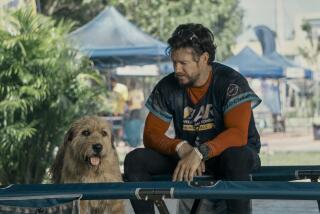Samuel Fuller’s ‘Dog’ has its day
- Share via
A cigar-chomping newspaperman turned two-fisted pulp auteur, Samuel Fuller (1912-1997) never had much use for subtlety. His signature style -- lurid, didactic, in-your-face -- would seem to leave little room for ambiguity. But because Fuller’s films were often more complex than his tabloid sensibility suggested, he spent a good deal of his career being misunderstood and battling controversy.
His breakthrough film, 1951’s Korean War drama “The Steel Helmet,” was labeled pro-Communist for depicting racism within the ranks of the U.S. Army. Although considered red-baiting propaganda by some, his Cold War-era noir “Pickup on South Street” (1953) was famously singled out for condemnation by J. Edgar Hoover, who deemed the Richard Widmark character insufficiently patriotic. But no Fuller film whipped up a bigger storm than “White Dog” (1982), his stark moral fable about a racist German shepherd.
With the threat of a boycott looming after the NAACP took issue with the premise, the film’s studio, Paramount, deemed it unfit for both theatrical and home-video release. It was Fuller’s last Hollywood movie and has been largely unseen outside of a brief belated run in 1991 and occasional late-night TV airings. It finally makes its DVD debut this week, courtesy of the Criterion Collection.
“White Dog” came with an intriguing pedigree. It was based on the 1970 book by Romain Gary, a semiautobiographical novel in which the French author and his wife, actress Jean Seberg, encounter a stray dog that has apparently been programmed to attack black people on sight. Gary’s book evolves into a wide-ranging meditation on race relations in this country, drawing on the queasy mood of late-’60s, newly post-civil-rights America and explicitly discussing Seberg’s involvement with the Black Panthers.
The idea for a movie adaptation had floated around Hollywood for some time; Roman Polanski and Arthur Penn were among the directors previously attached.
When the project landed with Fuller, who had worked infrequently since the mid- 1960s and whose previous film, 1980’s “The Big Red One,” was butchered by the studio, he revised the script with his friend Curtis Hanson, who had worked on an earlier version.
Fuller’s movie preserves the thematic kernel and the Hollywood Hills setting of Gary’s novel, but few of the details remain. The female protagonist, the canine’s adoptive protector, is still an actress (played by Kristy McNichol), though not an activist or movie star. A central character, the black animal trainer who tries to re-educate the dog, has been substantially altered. In the novel, he retrains the dog to attack whites; the trainer in the film (Paul Winfield) is a nobler figure, driven to cure the savage beast, whose racism he views not as something to be stamped out but unlearned.
The white dog registers as a flesh-and-blood creature as well as a free-floating metaphor. And while both Gary and Fuller make the point that racism is not innate but taught, they arrive at different conclusions when pondering what it means to reverse it.
In its blunt, bludgeoning way, “White Dog” ranks among the toughest and most probing examinations of racism in American cinema. Fuller’s brute-force direction gives this outrageous allegory the hyperbolic treatment it demands. The attacks are sudden and sickening, staged for maximum horror and typically accompanied by Ennio Morricone’s weeping strings -- the most shocking of the hate crimes takes place in a church, beneath a stained-glass window of Francis of Assisi, patron saint of animals.
The Criterion disc features video interviews with Hanson and producer Jon Davison, but the most telling extra, reprinted in the booklet, is a 1982 piece by Fuller, conceptualized as an “interview” with the film’s canine star. In this alternately funny and sobering mock-Q&A;, the white dog stresses repeatedly that it was a man who made his character a monster (“Man is capable of hatred. Animals are not”) and, in fluent Fuller-ese, turns the tables on his director: “Doesn’t your world make you want to vomit?”
--
More to Read
Only good movies
Get the Indie Focus newsletter, Mark Olsen's weekly guide to the world of cinema.
You may occasionally receive promotional content from the Los Angeles Times.






